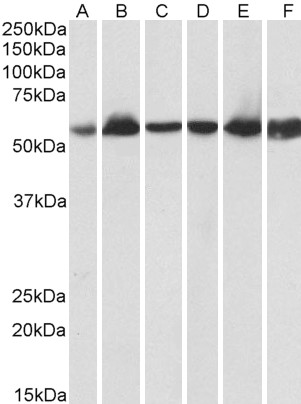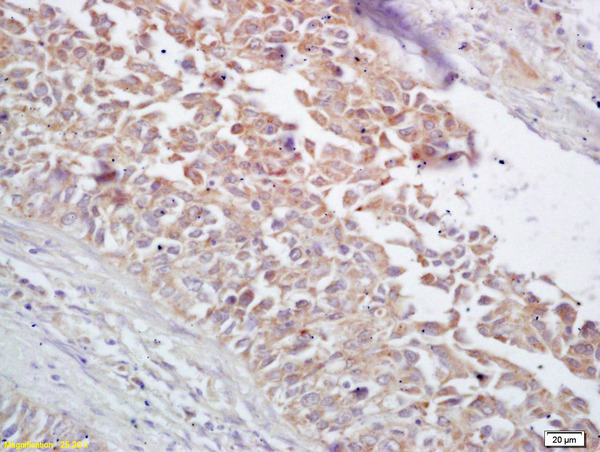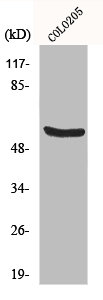![ICC/IF analysis of A431 cells using GTX25479 HSP60 antibody [2E1/53]. Cells were probed without (right) or with(left) an antibody. Green : Primary antibody Blue : Nuclei Red : Actin Fixation : Formalin Permeabilization : 0.1% Triton X-100 in TBS for 5-10 minute Dilution : 1:100 incubated overnight in a humidified chamber ICC/IF analysis of A431 cells using GTX25479 HSP60 antibody [2E1/53]. Cells were probed without (right) or with(left) an antibody. Green : Primary antibody Blue : Nuclei Red : Actin Fixation : Formalin Permeabilization : 0.1% Triton X-100 in TBS for 5-10 minute Dilution : 1:100 incubated overnight in a humidified chamber](https://www.genetex.com/upload/website/prouct_img/normal/GTX25479/GTX25479_668_ICC-IF_w_23060722_504.webp)
ICC/IF analysis of A431 cells using GTX25479 HSP60 antibody [2E1/53]. Cells were probed without (right) or with(left) an antibody. Green : Primary antibody Blue : Nuclei Red : Actin Fixation : Formalin Permeabilization : 0.1% Triton X-100 in TBS for 5-10 minute Dilution : 1:100 incubated overnight in a humidified chamber
HSP60 antibody [2E1/53]
GTX25479
ApplicationsImmunoFluorescence, ImmunoPrecipitation, Western Blot, ELISA, ImmunoCytoChemistry, ImmunoHistoChemistry, ImmunoHistoChemistry Paraffin
Product group Antibodies
ReactivityHuman, Mouse, Primate, Rat
TargetHSPD1
Overview
- SupplierGeneTex
- Product NameHSP60 antibody [2E1/53]
- Delivery Days Customer9
- Application Supplier NoteWB: 1-10 microg/ml. ICC/IF: 1:20-1:200. IHC-P: 1-10 microg/ml. IP: 2 microg. ELISA: 1-10 microg/ml. *Optimal dilutions/concentrations should be determined by the researcher.Not tested in other applications.
- ApplicationsImmunoFluorescence, ImmunoPrecipitation, Western Blot, ELISA, ImmunoCytoChemistry, ImmunoHistoChemistry, ImmunoHistoChemistry Paraffin
- CertificationResearch Use Only
- ClonalityMonoclonal
- Clone ID2E1/53
- Concentration1 mg/ml
- ConjugateUnconjugated
- Gene ID3329
- Target nameHSPD1
- Target descriptionheat shock protein family D (Hsp60) member 1
- Target synonymsCPN60, GROEL, HLD4, HSP-60, HSP60, HSP65, HuCHA60, SPG13, 60 kDa heat shock protein, mitochondrial, 60 kDa chaperonin, P60 lymphocyte protein, chaperonin 60, epididymis secretory sperm binding protein, heat shock 60kDa protein 1 (chaperonin), heat shock protein 65, heat shock protein family D member 1, mitochondrial matrix protein P1, short heat shock protein 60 Hsp60s1
- HostMouse
- IsotypeIgM
- Protein IDP10809
- Protein Name60 kDa heat shock protein, mitochondrial
- Scientific DescriptionThis gene encodes a member of the chaperonin family. The encoded mitochondrial protein may function as a signaling molecule in the innate immune system. This protein is essential for the folding and assembly of newly imported proteins in the mitochondria. This gene is adjacent to a related family member and the region between the 2 genes functions as a bidirectional promoter. Several pseudogenes have been associated with this gene. Two transcript variants encoding the same protein have been identified for this gene. Mutations associated with this gene cause autosomal recessive spastic paraplegia 13. [provided by RefSeq, Jun 2010]
- ReactivityHuman, Mouse, Primate, Rat
- Storage Instruction-20°C or -80°C,2°C to 8°C
- UNSPSC41116161

![ICC/IF analysis of U251 cells using GTX25479 HSP60 antibody [2E1/53]. Cells were probed without (right) or with(left) an antibody. Green : Primary antibody Blue : Nuclei Red : Actin Fixation : formaldehyde Dilution : 1:200 overnight at 4oC ICC/IF analysis of U251 cells using GTX25479 HSP60 antibody [2E1/53]. Cells were probed without (right) or with(left) an antibody. Green : Primary antibody Blue : Nuclei Red : Actin Fixation : formaldehyde Dilution : 1:200 overnight at 4oC](https://www.genetex.com/upload/website/prouct_img/normal/GTX25479/GTX25479_672_ICC-IF_w_23060722_644.webp)
![ICC/IF analysis of HeLa and NIH3T3 cells using GTX25479 HSP60 antibody [2E1/53]. Green : Primary antibody Red : Actin Fixation : Formalin Permeabilization : 0.1% Triton X-100 in TBS for 10 minutes Dilution : 10 μg/ml for at least 1 hour at room temperature ICC/IF analysis of HeLa and NIH3T3 cells using GTX25479 HSP60 antibody [2E1/53]. Green : Primary antibody Red : Actin Fixation : Formalin Permeabilization : 0.1% Triton X-100 in TBS for 10 minutes Dilution : 10 μg/ml for at least 1 hour at room temperature](https://www.genetex.com/upload/website/prouct_img/normal/GTX25479/GTX25479_670_ICC-IF_w_23060722_368.webp)
![ICC/IF analysis of NIH-3T3 cells using GTX25479 HSP60 antibody [2E1/53]. Cells were probed without (left) or with(right) an antibody. Green : Primary antibody Blue : Nuclei Red : Actin Fixation : formaldehyde Dilution : 1:100 overnight at 4 oC ICC/IF analysis of NIH-3T3 cells using GTX25479 HSP60 antibody [2E1/53]. Cells were probed without (left) or with(right) an antibody. Green : Primary antibody Blue : Nuclei Red : Actin Fixation : formaldehyde Dilution : 1:100 overnight at 4 oC](https://www.genetex.com/upload/website/prouct_img/normal/GTX25479/GTX25479_667_ICC-IF_w_23060722_896.webp)
![ICC/IF analysis of HeLa cells using GTX25479 HSP60 antibody [2E1/53]. Cells were probed without (right) or with(left) an antibody. Green : Primary antibody Blue : Nuclei Red : Actin Fixation : formaldehyde Dilution : 1:100 overnight at 4 oC ICC/IF analysis of HeLa cells using GTX25479 HSP60 antibody [2E1/53]. Cells were probed without (right) or with(left) an antibody. Green : Primary antibody Blue : Nuclei Red : Actin Fixation : formaldehyde Dilution : 1:100 overnight at 4 oC](https://www.genetex.com/upload/website/prouct_img/normal/GTX25479/GTX25479_671_ICC-IF_w_23060722_715.webp)
![IHC-P analysis of human breast carcinoma tissue using GTX25479 HSP60 antibody [2E1/53]. Left : Primary antibody Right : Negative control without primary antibody Antigen retrieval : heat induced antigen retrieval was performed using 10mM sodium citrate (pH6.0) buffer, microwaved for 8-15 minutes Dilution : 1:20 IHC-P analysis of human breast carcinoma tissue using GTX25479 HSP60 antibody [2E1/53]. Left : Primary antibody Right : Negative control without primary antibody Antigen retrieval : heat induced antigen retrieval was performed using 10mM sodium citrate (pH6.0) buffer, microwaved for 8-15 minutes Dilution : 1:20](https://www.genetex.com/upload/website/prouct_img/normal/GTX25479/GTX25479_1295_IHC-P_w_23060722_125.webp)
![ICC/IF analysis of HeLa cells using GTX25479 HSP60 antibody [2E1/53]. Cells were probed without (right) or with(left) an antibody. Green : Primary antibody Blue : Nuclei Red : Actin Fixation : Formalin Permeabilization : 0.1% Triton X-100 in TBS for 5-10 minute Dilution : 1:200 and incubated overnight in a humidified chamber ICC/IF analysis of HeLa cells using GTX25479 HSP60 antibody [2E1/53]. Cells were probed without (right) or with(left) an antibody. Green : Primary antibody Blue : Nuclei Red : Actin Fixation : Formalin Permeabilization : 0.1% Triton X-100 in TBS for 5-10 minute Dilution : 1:200 and incubated overnight in a humidified chamber](https://www.genetex.com/upload/website/prouct_img/normal/GTX25479/GTX25479_669_ICC-IF_w_23060722_730.webp)
![IHC-P analysis of human kidney tissue using GTX25479 HSP60 antibody [2E1/53]. Left : Primary antibody Right : Negative control without primary antibody Antigen retrieval : heat induced antigen retrieval was performed using 10mM sodium citrate (pH6.0) buffer, microwaved for 8-15 minutes Dilution : 1:100 IHC-P analysis of human kidney tissue using GTX25479 HSP60 antibody [2E1/53]. Left : Primary antibody Right : Negative control without primary antibody Antigen retrieval : heat induced antigen retrieval was performed using 10mM sodium citrate (pH6.0) buffer, microwaved for 8-15 minutes Dilution : 1:100](https://www.genetex.com/upload/website/prouct_img/normal/GTX25479/GTX25479_1296_IHC-P_w_23060722_494.webp)
![IP analysis of HeLa cell lysates using GTX25479 HSP60 antibody [2E1/53]. IP reaction : 2μg antibody / 500μg lysate Dilution : 1 μg/ml IP analysis of HeLa cell lysates using GTX25479 HSP60 antibody [2E1/53]. IP reaction : 2μg antibody / 500μg lysate Dilution : 1 μg/ml](https://www.genetex.com/upload/website/prouct_img/normal/GTX25479/GTX25479_1446_IP_w_23060722_353.webp)
![ICC/IF analysis of NIH-3T3 cells using GTX25479 HSP60 antibody [2E1/53]. Cells were probed without (left) or with(right) an antibody. Green : Primary antibody Blue : Nuclei Red : Actin Fixation : Formalin Permeabilization : 0.1% Triton X-100 in TBS for 5-10 minute Dilution : 1:20 overnight at 4oC ICC/IF analysis of NIH-3T3 cells using GTX25479 HSP60 antibody [2E1/53]. Cells were probed without (left) or with(right) an antibody. Green : Primary antibody Blue : Nuclei Red : Actin Fixation : Formalin Permeabilization : 0.1% Triton X-100 in TBS for 5-10 minute Dilution : 1:20 overnight at 4oC](https://www.genetex.com/upload/website/prouct_img/normal/GTX25479/GTX25479_666_ICC-IF_w_23060722_437.webp)





![ICC/IF analysis of HeLa cells using GTX25478 HSP60 antibody [4B9/89]. Cells were probed without (right) or with(left) an antibody. Green : Primary antibody Blue : Nuclei Red : Actin Fixation : Formalin Permeabilization : 0.1% Triton X-100 in TBS for 10 minutes Dilution : 1:50 for at least 1 hour at room temperature](https://www.genetex.com/upload/website/prouct_img/normal/GTX25478/GTX25478_661_ICC-IF_w_23060722_354.webp)

![WB analysis of HeLa whole cell lysate using GTX02649 HSP60 antibody [HSPD1/2206R].](https://www.genetex.com/upload/website/prouct_img/normal/GTX02649/GTX02649_20210319_WB_w_23053122_319.webp)
